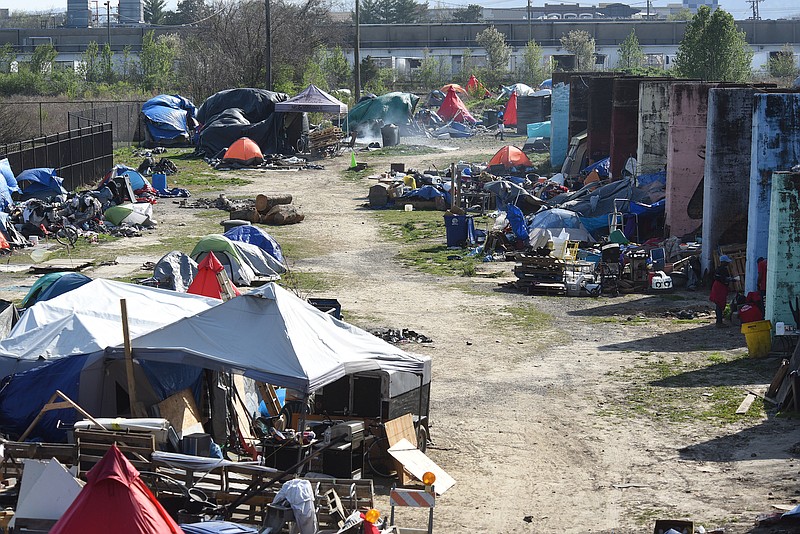The city of Chattanooga is working to remove a homeless encampment on 11th Street, a move that would displace about 150 people.
City officials in a Wednesday announcement cited safety issues with the homeless population being near active railroad tracks and said they are working with Norfolk Southern, which owns the property, and multiple homelessness organizations to find housing for the people by May 31.
"I'm proud of our service providers and community partners who are working diligently and alongside our team to ensure residents of the property are quickly housed," Mayor Tim Kelly said in a statement. "I am also grateful to Norfolk Southern for committing resources for relief and rehousing efforts and for being flexible on a timeline to allow the city to come into compliance with safety requirements on their property."
(READ MORE: Chattanooga is considering a supervised homeless camp on 12th Street)
Residents of the encampment were notified Wednesday that Norfolk Southern requested they be relocated.
Those seeking assistance will be enrolled in the city Office of Homelessness and Supportive Housing's Rapid Re-housing Program, and the Chattanooga Housing Authority has made Section 8 vouchers and public housing units available to those in the program.
The city is looking to connect the residents to either permanent housing or an upcoming supervised homeless encampment on 12th Street near Peeples Street. They will be placed through the Chattanooga Regional Homeless Coalition.
Sam Wolfe, the city's director of homelessness and supportive housing, in a Wednesday phone interview said the encampment will have a capacity of 120 people, although it could be expanded, and it will be opened before the May 31 deadline.
(READ MORE: Chattanooga organizations consider building small shelters for homeless people)
"The sanctioned camp would give them a level of stability unrealized in an unsanctioned encampment," Wolfe said.
Wolfe added that although residents of the encampment were given more leniency since COVID-19 exacerbated homelessness in the area, recent events such as the city uncovering a stockpile of propane tanks in a tent have made relocation more urgent.
"There's been some assault, there was an attempted murder that happened there a few weeks ago," he said. "We've been hearing from people staying at the site that they are in dire need of resources."
In a Wednesday phone interview, Wendy Winters, executive director of the Chattanooga Regional Homeless Coalition, said resources are limited amid "astronomical" growth in homelessness in the region, including noticeable growth at the 11th Street encampment specifically.
The coalition will use its referral system, known as "coordinated entry," to help find housing for the residents and prioritize those who are most vulnerable and in danger of perishing on the streets, she said.
"We will be looking at the needs of each person from this camp and we will refer them to the resource that best meets those needs," Winters said. "Before coordinated entry, a person might bounce around from agency to agency, never finding the help they need. Now, no matter where they present, they have access to the same referral system. Our homeless response outreach efforts are also coordinated, a necessity with an increase in those experiencing unsheltered homelessness. Outreach workers from several agencies in the homeless response work together to make sure all camps are visited and that folks have what they need to survive, and those outreach workers are also engaging people experiencing homelessness, building trusting relationships, with the hope that they can link them to housing; however, those placements are hard to come by in this affordable housing crisis."
City officials have also cited an increase in average rent and home costs as a contributor to homelessness. In addition, paired with the economic impact of COVID-19, eviction rates have increased as people struggle to afford housing.
Homelessness in the county rose by 80% between 2020 and 2021, according to a recent report by the Eviction Prevention Initiative.
The median home sales price in the county grew from $130,000 to $230,000 between 2010 and 2020, the report states. The average rent for a two-bedroom apartment between 2016 and 2021 grew from $775 to $1,150.
Contact Logan Hullinger at lhullinger@timesfreepress.com or 423-757-6416. Follow him on Twitter @LoganHullinger.

